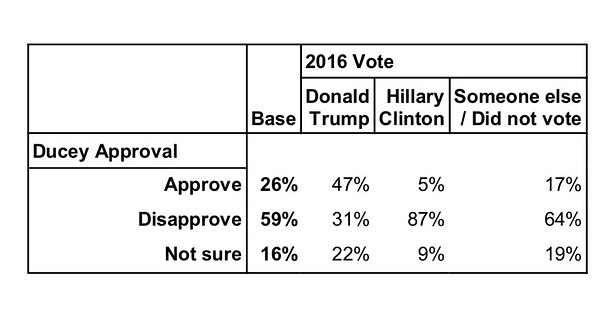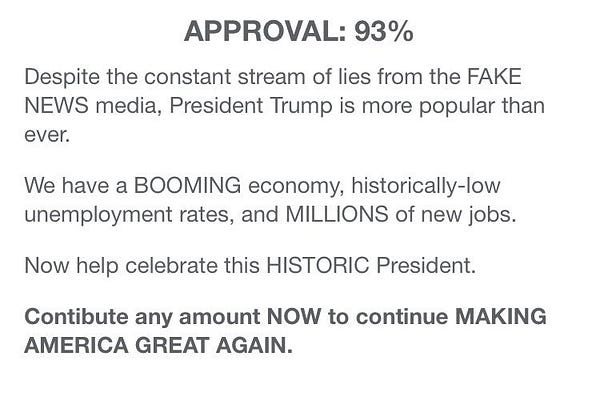The Daily Agenda: The public approves
They kinda like her ... But she's no Taylor Swift ... And chowder, anyone?
Gov. Katie Hobbs got her first performance evaluation in the form of a public approval rating poll, and the numbers could certainly be worse.
In all, OH Predictive Insights found that 43% of Arizonans approve of the job the governor has done in her first two months in office, while only 30% disapprove. When it comes to Republicans, about 75% think she’s doing a bad job, but she’s still above water with independents, about 35% of whom like what they’ve seen so far (28% disapprove).
While being liked by just 43% of the state isn’t the best bragging point, many politicians would sell their souls for a 13-point positive approval rating.


Already, Hobbs is far more beloved than former Gov. Doug Ducey was at about this point in his first term. While Ducey’s approval swung wildly during his eight years in office, he was never exactly beloved by the voters. By the time he left office, he was the least popular Republican governor in the country.
The first public opinion poll of Ducey’s tenure we can track down came from May 2015. By that point, the new governor had already passed a historically fast budget1 after agreeing with Republican lawmakers that the state government needed some serious slashing. Public Polling Partners, a Democratic pollster, found at the time that only 27% of Arizonans agreed with the job the former ice cream salesman was doing, while 44% disapproved.
While his numbers crept up after that initial poor assessment, they tanked during the pandemic, as Arizona became a hotspot for COVID-19 in 2020. Ducey never made the top 10 most liked governors list from Morning Consult, which does quarterly governor approval polls2. In fact, he at one point wound up on the least popular list.
Of course, like all polling numbers, approval ratings are an inexact science. (Ducey headed into his 2018 re-election underwater with the voters, for example, yet he pulled off a double-digit victory over Democrat David Garcia.)


But the polls are a decent barometer of public sentiment that can offer a glimpse into what’s driving politicians' decisions — often, it’s simply a desire to be liked.
In politics, you’re never going to please everyone. You’re lucky if more than half the population likes you at any given moment. Hobbs didn’t reach that threshold, but she starts off in a better place than her predecessor. It’ll be up to her to ensure this is her floor, not her ceiling.
Uno reverse card: Attorney General Kris Mayes reversed an opinion from her predecessor, saying that cities do have the ability to create local ordinances that ban source-of-income discrimination in renting and home-buying. Former AG Mark Brnovich had opined that Tucson’s ordinance violated state law in response to a lawmaker complaint. Mayes’ decision clears the way for Tucson and for a new ordinance to go into effect in Phoenix. Source-of-income discrimination bans make it so renters and sellers can’t decide not to rent or sell to a person depending on where their funds come from, like a government program.
Junkets are part of the job: The Arizona Corporation Commission is set to discuss an ethics complaint Tuesday against commissioner Kevin Thompson over attending a conference in January with “financial institutions that invest in Arizona’s utilities,” as he wrote on Facebook. A consumer advocate filed a complaint, saying the junket amounted to ex parte communications. Thompson said he didn’t discuss any active cases and the commission paid for his travel, the Yellow Sheet notes.
Today in city elections: Interest groups have been pouring money into Phoenix City Council races ahead of Tuesday’s election, the Republic’s Taylor Seely reports. GOP gubernatorial contender Karrin Taylor Robson is backing former cop Kevin Robinson over former Kari Lake campaign aide Sam Stone for the District 6 council seat, outraging Lake. Tucson Mayor Regina Romero officially launched her re-election campaign last week for Tucson’s August primary election, the Tucson Sentinel’s Bennito L. Kelty writes, while potential challengers are still trying to qualify for the ballot. And Glendale Mayor Jerry Weiers, facing his own re-election challenge next year, is temporarily changing the city’s name to something Taylor Swift-related because she’s having two concerts there.

It’s a small county and nobody lives there: The Nogales International’s Angela Gervasi has lots of questions about Santa Cruz County’s decision to hire former mining company executive and county manager Greg Lucero as a consultant, and now the county appears to be looking into its own hiring and contract practices. Meanwhile, Gervasi separately notes that the county is beginning contract negotiations with its next county manager, who doesn’t live in the county, without opening the search to other applicants.
Fall down a rabbit hole, not a mine: On this week’s edition of Arizona Public Media’s “The Buzz,” Chris Connover and Zachary Zeigler spend a half-hour geeking out about Arizona’s dangerous abandoned mines, which number somewhere between 13,000 and 200,000, depending on who you ask. And Tucson’s Gem and Mineral Show got the New York Times treatment in this feature complete with stunning photos.


Schools are so hot right now: School board controversies are spilling onto Fox News, the Arizona Capitol Times’ Kierra Riley and Wayne Schutsky write, noting that the push to fire Scottsdale Unified Superintendent Scott Menzel is far from the only organized effort to oust superintendents in Arizona. After Fox picked up on an email from a principal in the Catalina Foothills District near Tucson with a ”confidential” list of students who used different pronouns, the district is now on its heels, saying staff wouldn't keep that information from parents who inquire, the Daily Star’s Genesis Lara writes. Meanwhile, as Republican Rep. Rachel Jones attempts to break up the state’s second-largest school district, Tucson Unified School District, her House Bill 2546 would also split up the state’s largest school district, Mesa Public Schools, as an unintended but not necessarily unwelcome consequence, Capitol scribe Howard Fischer reports. Neither district wants to be broken up. Arizona Christian University is suing the Washington Elementary School District after the district ended a student-teaching agreement between the university and the district over the university’s anti-gay beliefs. And finally, lawmakers gave preliminary approval to a bill directing the Department of Education to come up with a list of books to be banned from public schools, Fisher reports.
Make the fed the target again: Arizona conservatives used to be known for railing against the federal government, but now they just pick fights with cities, including the latest dust-up over charter cities, running counter to the conservative ideology that the government closest to the people knows best, former New York Times editor turned University of Arizona journalism school professor William Schmidt writes in the Daily Star opinion page.
Consulting the mountains and streams: California water gurus are complaining that the other lower basin states, including Arizona, didn’t consult them before they all signed an agreement last month that California didn’t sign, and California’s U.S. Senators are echoing their complaints, Colorado’s KUNC reports. Arizona officials said that depends on the definition of “consult.” Meanwhile, strong winter snows have left reservoirs in Arizona flush for the first time in a long time, the Payson Roundup’s Peter Aleshire writes. In other environmental news, the Sierra Club’s new executive director Ben Jealous stopped in Phoenix for a South Mountain hike as part of a national tour, the Republic’s Jake Frederico writes. Jealous is the first person of color to lead the organization.
Lots to complain about but not that: The latest attempt to abolish the state Bar as a regulatory agency on lawyers is based on Republican Sen. Justine Wadsack’s unfounded belief that the Bar was telling lawyers to not take on COVID-19 cases. The Arizona Mirror’s Caitlin Sievers writes that Wadsack claims, without evidence, that attorneys told her “if they did, the Arizona State Bar would immediately disbar them.”
Trying to enforce vague laws: Body camera footage of Maricopa County deputies talking to drop box watchers who monitored polling sites last year shows the law enforcement officers calmly explaining the laws on voter intimidation and measuring to make sure the observers weren’t too close to the boxes, the Washington Post’s Yvonne Wingett Sanchez and Adriana Usero report. Maricopa County Sheriff Paul Penzone told the paper his office spent $665,000 working the 2022 elections.
Bad news for 2024: A review of local elections officials who refused to certify the 2022 results showed that none have so far faced any legal consequences for their decisions, ProPublica’s Doug Bock Clark reports. While two people who refused certification in North Carolina could be removed from their posts, the AG’s office here hasn’t said whether the two supervisors in Cochise County are being investigated for their certification refusals. In other states, prosecutors have not brought any charges against local officials who wouldn’t certify.
Veto stamp is active: Gov. Katie Hobbs vetoed a so-called anti-critical race theory bill from Republican Sen. J.D. Mesnard that would have prohibited certain teachings on race and ethnicity. Hobbs said Senate Bill 1305 and others like it “serve to divide and antagonize.” Mesnard called the veto “a slap in the face to parents who came forward with serious concerns about the racism being taught in their children's classrooms.”







